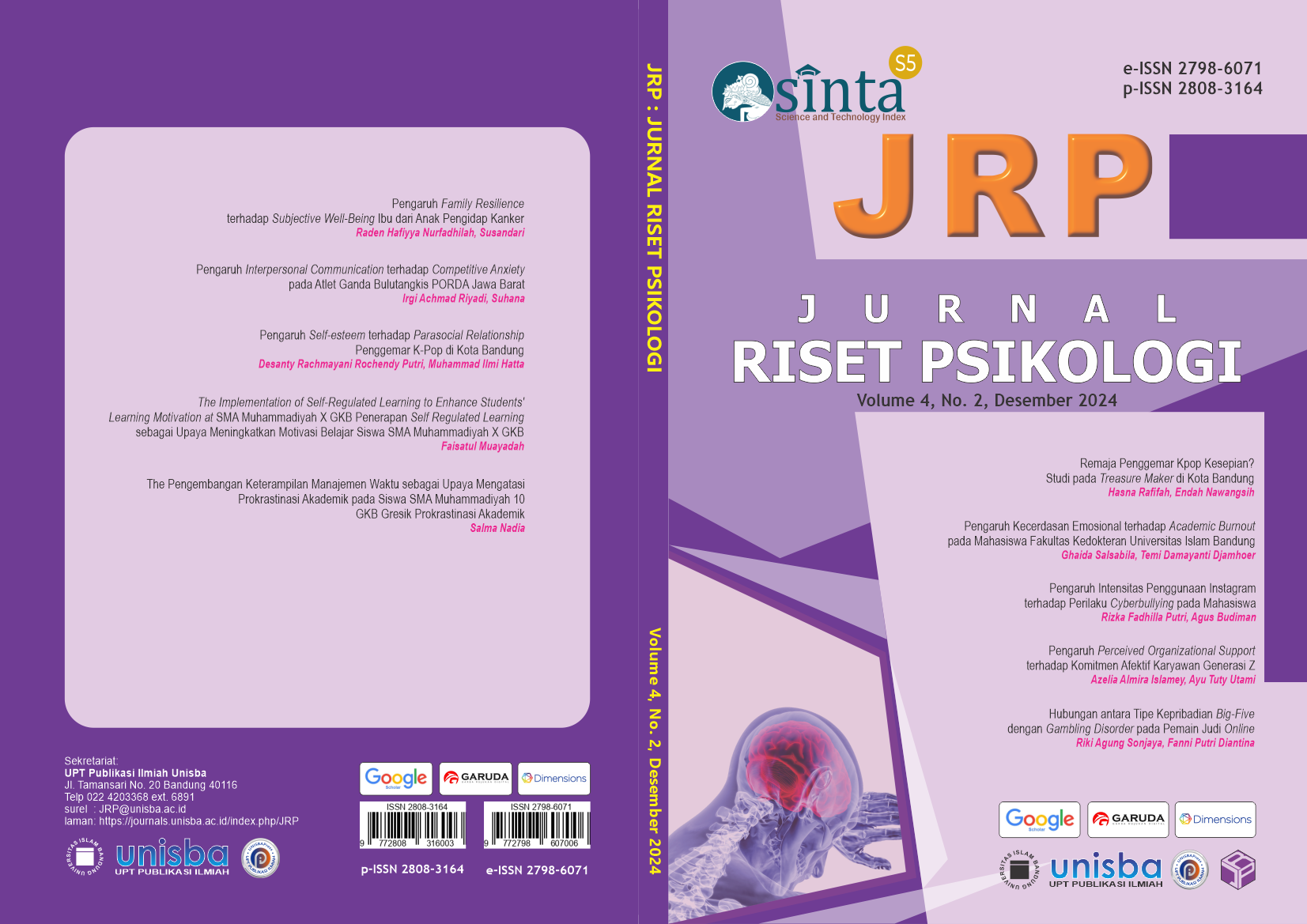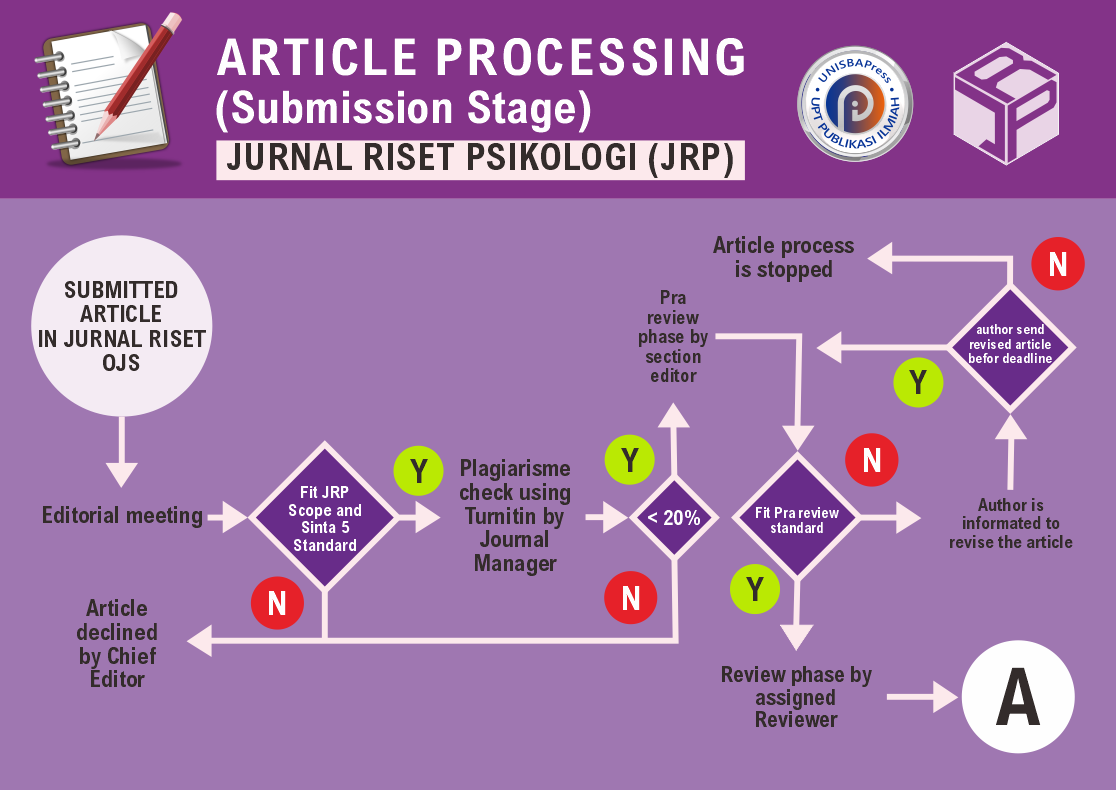Pengaruh Perceived Organizational Support terhadap Komitmen Afektif Karyawan Generasi Z
DOI:
https://doi.org/10.29313/jrp.v4i2.5122Keywords:
Affective Commitment, Perceived Organizational Support, Generation Z EmployeesAbstract
Abstract. In a dynamic work environment, it is important for organizations to have a deep understanding of Generation Z. Allen & Meyer (1991), defined affective commitment as an individual's emotional attachment to the organization they work for. One way to increase this affective commitment is to provide organizational support to employees. Eisenberger (1986) defines perceived organizational support as the perception of employees as the extent to which employees feel that their organization values their contribution and cares about their well-being. The purpose of this study is to find out the influence of perceived organizational support on the affective commitment of generation Z employees. The method used in this study is a quantitative causality method using simple linear regression analysis. The instrument used is The Survey of Perceived Organizational Support (SPOS) based on Eisenberger's theory (1986) adapted by Syahputra, W., Yundianto, D., & Indrawardhana, E. (2022) and the affective commitment scale from Allen & Meyer (1991) which has been adapted by Suseno, M. N. M. (2019). The results of this study show that perceived organizational support has an influence on affective commitment of 0.307, meaning that there are other factors that can affect the existence of affective commitment in generation Z employees in Bandung city corporations.
Abstrak. Lingkungan kerja yang dinamis, penting bagi organisasi untuk memiliki pemahaman tentang generasi Z. Allen & Meyer (1991), mendefinisikan komitmen afektif sebagai ikatan emosional individu terhadap organisasi tempat mereka bekerja. Salah satu cara meningkatkan komitmen afektif adalah dengan memberikan dukungan organisasi kepada para karyawan. Eisenberger (1986) mendefinisikan perceived organizational support sebagai persepsi karyawan megenai sejauh mana karyawan merasa bahwa organisasi menghargai kontribusi dan peduli terhadap kesejahteraan mereka. Tujuan dari penelitian ini adalah untuk mengetahui adanya pengaruh perceived organizational support terhadap komitmen afektif karyawan generasi Z. Subjek pada penelitian ini adalah karyawan generasi Z di korporasi kota Bandung, yang berjumlah 96 orang. Metode yang digunakan dalam penelitian ini yaitu metode kuantitatif kausalitas dengan menggunakan analisis regresi linier sederhana. Instrumen yang digunakan adalah The Survey of Perceived Organizational Support (SPOS) berdasarkan teori Eisenberger (1986) yang diadaptasi oleh Syahputra, W., Yundianto, D., & Indrawardhana, E. (2022) dan skala komitmen afektif dari Allen & Meyer (1991) yang telah diadaptasi oleh Suseno, M. N. M. (2019). Hasil pada penelitian ini menunjukkan bahwa perceived organizational support memiliki pengaruh terhadap komitmen afektif sebesar 0.307 artinya terdapat faktor lain yang dapat mempengaruhi adanya komitmen afektif pada karyawan generasi Z di korporasi kota Bandung.
References
N. Ghaniyyaturrahmah and T. D. Djamhoer, “Pengaruh Perceived Organizational Support terhadap Work Engagement pada Perawat RSUD Majalengka,” Jurnal Riset Psikologi, vol. 3, no. 2, pp. 93–100, Dec. 2023, doi: 10.29313/jrp.v3i2.2752.
N. Sundari and A. T. Utami, “Hubungan Keadilan Organisasi dengan Komitmen Organisasi pada Karyawan Generasi Milenial,” Jurnal Riset Psikologi, pp. 21–26, Jul. 2022, doi: 10.29313/jrp.v2i1.676.
J. P. Meyer and N. J. Allen, “―A three-component conceptualization of organization commitment‖,” Human Resource Management Review, vol. 1, no. 1, pp. 61–98, 1991.
L. Rhoades, R. Eisenberger, and S. Armeli, “Affective commitment to the organization: the contribution of perceived organizational support.,” Journal of Applied Psychology, vol. 86, no. 5, pp. 825–836, 2001.
R. Eisenberger, R. Huntington, S. Hutchison, and D. Sowa, “Perceived organizational support.,” Journal of Applied Psychology, vol. 71, no. 3, pp. 500–507, Aug. 1986, doi: 10.1037/0021-9010.71.3.500.
L. Rhoades and R. Eisenberger, “Perceived organizational support: A review of the literature.,” Journal of Applied Psychology, vol. 87, no. 4, pp. 698–714, 2002, doi: 10.1037/0021-9010.87.4.698.
Deloitte, “Gen Z and Millennial Survey : Living and working with purpose in a transforming world,” Deloitte.
K. Beckman, “Will Gen Z be the Next Generation of Job Hoppers? ,” Ripplematch.
A. Hanifah, “Indonesian Gen Z Work Values, Preference between Startups and Corporations, and Intention to Apply,” Jurnal Ekonomi dan Kewirausahaan West Science, vol. 1, no. 3, pp. 236–245, 2024.
Mangundjaya. W. L. and Panuju N. F, “Persepsi Dukungan Organisasi dan Komitmen Afektif Organisasi: Peran Mediasi Keterikatan Karyawan pada Karyawan Pertelevisian,” Psikohumaniora: Jurnal Penelitian Psikologi, vol. 3, no. 2, pp. 223–238, 2018.
W. Syahputra, D. Yundianto, and E. Indrawardhana, “Instrument validation of perceived organizational support (POS) indonesian version: A rasch model analysis,” Psikoislamika: Jurnal Psikologi dan Psikologi Islam, vol. 19, no. 2, pp. 423–436, 2022.
J. P. Meyer and J. Allen, “Commitment in the workplace: Theory, research, and application,” Sage publications, 1997.
M. N. Suseno, "Pengujian Psikometris Skala Psikologi : Komitmen Organisasi dan Komitmen Afektif”. Yogyakarta, 2019.
W. Andini and E. Parahyanti, “Relationship between perceived organizational support and organizational affective commitment: Moderating role of psychological contract breach.,” in In 2nd International Conference on Intervention and Applied Psychology (ICIAP 2018), Atlantis Press, 2019, pp. 1000–1011.
N. J. Meyer, J. P., & Allen, Commitment in the workplace: Theory, research, and application. SAGE Publications, Inc, 1997.













